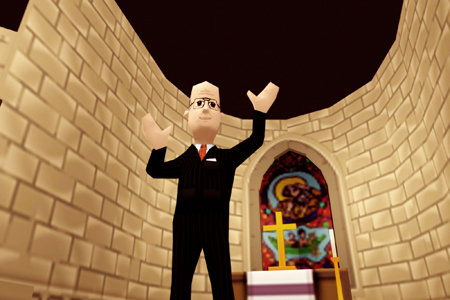| |
 |
 |
 |
| The story so far... |
 |
| You're currently on our features and projects pages, with material ranging from the satirical to the theological. For more features, click here. |
| |
|
|
 |
 |
 |
| Who cares about online sacraments? |
 |
In June and July, we ran a survey asking people how they feel about online sacraments. Mark Howe reports on the 362 responses we received, which will help inform the way we run our experiment in online communion over the autumn.
Many thanks to the 362 people who completed our survey (see the questions here, but don't fill them out as the survey is closed). That's about 87% of those who completed the first page. 56% of respondants were men, and about a quarter were born in each of the 50s, 60s and 70s. 69% were resident in the UK, with 20% in North America, 5% in the rest of Europe and 5% in Australasia.
This wasn't a population survey, as the respondants were self-selecting. But it's interesting to see who selected themselves. From suggestions made in various forum discussions, we might have expected the topic to be of most interest to those from "mere memorialist" denominations, or to those who are not committed to church, or to hardcore computer addicts, or to those already committed to online church.
In reality, 59% of respondants were Anglican, with 9% Catholic, 7% Methodist, 5% Reformed and 5% Baptist. Four out of five attended church "most weeks". While the majority use Facebook, Twitter and forums at least "most months", less than one in eight used chatrooms, and less than one in 12 used virtual worlds or online games. There were more positive than negative evaluations of online church, but over two-thirds of respondants were either neutral or didn't know enough about online church to express an opinion.
Together, wherever, in new ways
The survey was intended to do several things, including providing some background information on those who take part in the various experiments. However, the open-ended questions – completed by the majority of respondants – do provide a glimpse of what goes through people's minds when they think about online sacraments.
When asked what they found most exciting about the concept of online communion, a third of all respondants referred to the potential international or universal church dimension. For example...
"Community no longer restricted by geography."
"The reminder of the globalness of my faith."
"The acknowledgement that Christ can minister and show his love everywhere."
"The sense of a wider church community... than can be seen in one room."
Many responses also stressed the potential for genuine community via the Internet, for example, "I believe the sum can be greater than the parts. It's not just about me sitting here with the computer."
Exciting prospect number two was making communion more accessible:
"The sacraments then become available to those unable to make it to a bricks and mortar church."
"The availability of communion during a working day."
"A doorway in for some people who would not otherwise experience those sacraments."
Related to this was the notion that online sacraments would be "better than nothing" for those who are unwell, isolated or rejected by conventional churches.
The third cause for excitement was novelty and creativity:
"Exploration of the Holy in new ways."
"The merger of communication technology with God's creativity."
A related theme was that "it potentially reflects and contributes to a critical engagment with the way IT is impacting how we 'meet', communicate, nurture relationships etc". For another respondent: "A further exploration of what it means to be the gathered body of Christ, one that transcends space, much as the Kingdom of God does."
Other, less common themes included richer interaction with existing online friends, validating the concept of online church by providing sacraments and "It takes the power away from ordained clergy".
On the basis of the above, it seems that at least some Christians see or at least hope for a bright future for online sacraments. More than that, one respondant in three saw potential for online sacraments to stress unity and universality more effectively than conventional sacraments. In my opinion this is significant because, unless online sacramentality offers something beyond conventional sacramentality, there will always be a tendency to slip into either mimicking offline rituals or concluding that online can never be "the real deal".
Really offended by unreal sacraments
About as many words in total were devoted to describing disturbing aspects of online sacraments. Top of the list was whether there could be a genuine community dimension to online sacraments:
"The physical solitude... alone in front of a screen."
"The fragile and partial nature of online community."
"Virtual church is not a real gathering of flesh and blood people, but an electronic gathering of avatars and personae."
Conversely, concerns were also expressed that the community aspect might work well enough to stop people from attending church physically: "Will we eventually end up with people not bothering to come to a non-virtual church at all?"
Second came concerns about trivialising or mocking the sacraments:
"People not treating it reverently."
"I can see a danger of falling into a form of play-acting."
"I would be upset if other people weren't taking it seriously or the person running it wasn't."
In third place, there was concern about the non-physicality of online sacraments:
"This experience is all in the person's mind."
"I'm not sure theologically if Christ would be present in bread and wine blessed remotely over a computer chatroom or video."
"Sacramentality requires tangibility."
"The real absence."
The fourth concern was about how other Christians would react to online sacraments:
"The distress that will be caused to other Christians."
"It will intensify the division between online church and the established churches."
"The predictable howls of outrage from people who dislike the idea."
"Don't tell my priest!"
Other concerns included the lack of ordained leadership, lack of access for the elderly, difficulty in concentrating on one thing in front of a computer screen and, somewhat dramatically, the possibility of blessed sacraments being used to conduct black masses.
Obviously some of these concerns assume particular theological or denominational commitments – for example, ordained leadership was more of an issue for Anglicans than for Baptists. But it is clear that almost all the respondents considered the topic to be serious, and did not want sacraments turned into a game. As for the reality of online community, there's probably only one way find out...
What happens next?
We'll be analysing the results more closely as the experiment continues. About half of those responding left an email address, and we will be contacting them in due course. Our plan is to run six experiments that each explores different technology and different approaches to online sacraments. Some of them will be open to anyone who wishes to join in, while others will need to be restricted to a smaller group.
We'll be asking participants to provide detailed feedback on each experiment, and we'll continue to report what we discover along the way. And of course here is the thread for feedback on this article. |
|
|
|
|
|
|


